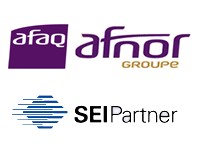Case Study: Productivity Improvements
The client was impacted by the low Productivity at the developers’ level and wanted to develop and institutionalize a consistent, repeatable and measurable approach to increase the productivity of the developers at all levels.
With a team of highly qualified professionals, DQS Certification India Private Limited, a Delhi Quality Services initiative for Corporate Excellence since 1994, and Authorized Transition Partner with SEI (Software Engineering Institute), Carnegie Mellon University (CMU), Pittsburgh, USA for providing CMMI® Assessment and Training Services, was able to meet the client’s expectations.
PRODUCTIVITY IMPROVEMENTS WITH CMMI® QUALITY FRAMEWORK
Industry
Development for Telecom
The Client
A leading Tunisia based Software Development Company, developing for Telecom and Automotive domain.
The Challenge
To improve the Productivity of developers at all levels, so that measured improvement in productivity and return on investment are visible and company can have recurring orders from customers.
The Solution
Using the CMMI® framework, DQS India conducted an initial study of the processes and identified the most critical process changes that would have a maximum impact to improve the productivity.
During this study DQS Subject Matter Experts (SMEs) studied the Effort Distribution of different projects and derived various conclusions. One of the main factors was REWORK EFFFORT that was causing the maximum loss of productivity.
Based on the REWORK FACTOR various improvements were suggested and were implemented by the client with the help of the DQS India SMEs.
Summary of the changes suggested and incorporated at the organizational and project level is:
- Trainings on different Requirements Elicitation Techniques were provided to the Requirement Gathering Team at the company. This lead to the minimal Change Request from the client and less effort is spent on rework.
- Training on Estimation Techniques was provided to the Technical Team for better estimation, so that Effort can be best estimated for Development and Non-Development Effort.
- Productivity Target and defects rate at Individual Programmers Level was set so that each developer was aware of his targets for productivity and defect injection. The monitoring of these targets was done on daily and weekly basis and correction was taken on daily and weekly basis by the Project Leaders.
- Productivity log and Defect injection log were maintained for every programmer on daily basis.
- Training on Best Coding Practices was provided to the team.
- Use of Learning Database was demonstrated to the teams so that learning in all projects was shared across organization.
Results in Improvement in Productivity: Before and After


Quantitative Benefits
15-20% improvement in Productivity was achieved as a result of reduced Rework Effort in the projects.
Key Benefits
Improved the teams productivity to deliver software projects on-time and within budgets & to the maximum expectation of the client. This help in increasing the number of recurring order from the clients.
Feedback:
Thanks for your time to read this Article.
Your feedback is welcome at: rkhare@dqsindia.com


